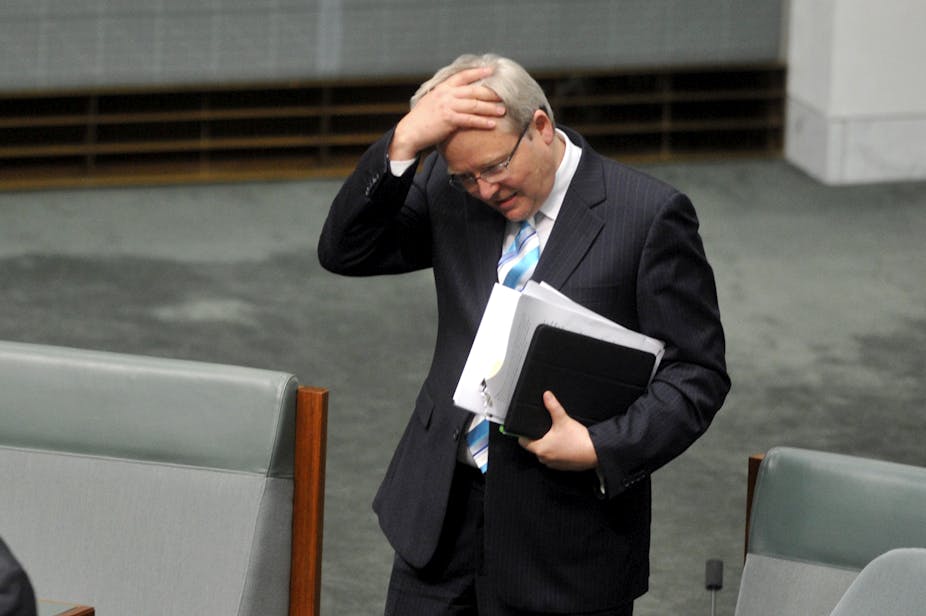The current wars being waged in Australian electoral politics tend to be over what rights are left to Australian voters regarding their leaders.
The ambush of Kevin Rudd by supporters of the current Prime Minister Julia Gillard was but the most conspicuous example. Some, like Tony Abbott, have termed it the “faceless man” syndrome, a pathology motivated by conspiratorial madness. This is meaningless in of itself (those faces are very conspicuous), but it does have a strong resonance. Elected leaders are going into retirement by the knife. A dangerous precedent is being set.
That was made clear with the deposing of Victorian Premier Ted Baillieu. Baillieu’s speech in the aftermath sounded like a Soviet party official who had been smeared and rewarded with a death sentence: “I love this state. I love the Liberal party”.
The new premier is Dennis Napthine, who is doing the usual window dressing about what happened. No, he claims, Baillieu was not “knifed”. “Ted Baillieu looked around and said that he felt that he didn’t have the support that he needed and he therefore made the decision of his own volition,” according to Napthine.

Baillieu was in a spot of hideous bother after problems with his deputy Peter Ryan and the departure of former police commissioner Simon Overland. Things reached a head with the resignation of Liberal backbencher Geoff Shaw, who will sit as an independent.
As Peter van Onselen observed in The Australian, “Removing a first-term incumbent leader should have been taboo after the turmoil that followed Labor’s decision to make such a move against Kevin Rudd.”
The Liberal Party has shown that it is not immune to what has come to be known as the New South Wales Disease, a corrupt, Tammany Hall style of politics that disposes of elected leaders at the pleasure of party room politics. Even former Queensland Premier Anna Bligh, herself a Labor politician, found the appellation convincing when it came to the campaign trail. Bligh had no intentions of being cornered by party room apparatchiks schooled in the rough arts of push and shove:“I do not intend to let the NSW disease, which views leadership as a revolving door, undermine a democratic mandate in Queensland.”
That grand state has a track record on premier mortality, courtesy of the heavies of the NSW Right. First, Morris Iemma fell as premier in 2008. Then came Nathan Rees, sacked in December 2009 and replaced by Kristina Keneally.
The same faction also precipitated that ambush most foul and famous – the fall of Rudd. Again, Bligh, putting in one for a fellow Queenslander, suggested that the disease hadn’t infected Australia’s entire body politic - “It hasn’t worked in NSW, and failed miserably federally. Queensland will not be affected by the NSW corrosion.”
Not only is the NSW Right disdainful of the public, it would probably substitute the ballot with a pale version of caucus room dealing if it could. Indeed, the then NSW Premier Keneally suggested that such a disease did not mean that Labor had done poorly at the 2010 federal election, certainly not more so than their Queensland counterparts:
“The fact is NSW had a net loss of one seat at last weekend’s election and Queensland had a net loss of nine”
Anti-democratic coups have their place then.

The most audacious of such coups was perpetrated by Paul Keating, Labor’s patricidal genius. Australian federal politics is forever stained by Keating’s challenges against Bob Hawke, the second of which was successful in December 1991. It might even be argued that Keating’s electoral victory cemented his tactic’s legitimacy. It was the crime made good – he had, after all, overthrown the tired father of the party, yielding that victory for the faithful. The tribe was pleased.
A country governed by unelected pollsters and tribal factions rather than policy made by mandate is but a public relations creature. While we can always argue that the “will” of the people is a convenient fiction pressed upon us to justify the legitimacy of a government, the deposing of leaders during their terms without an electoral say is potentially dangerous.
At best, it suggests contempt for electoral processes held in public. At worse it is dangerous to any ideas of integrity we might have for constitution and country. Which suggests that, if ever there was any need for constitutional reform, a provision that preserves the elected leader for the duration of that tenure, or at least till an election is called, should be considered.
Voters, not party room hacks, need to decide.

